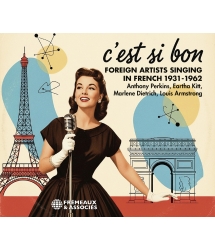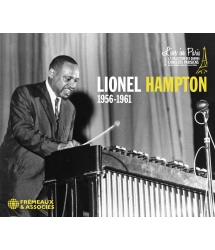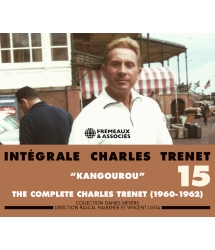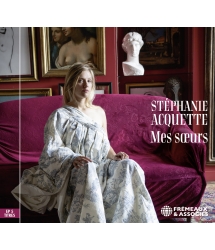- Our Catalog
- Philosophy
- Philosophers of the 20th century and today
- History of Philosophy (PUF)
- Counter-History and Brief Encyclopedia by Michel Onfray
- The philosophical work explained by Luc Ferry
- Ancient thought
- Thinkers of yesterday as seen by the philosophers of today
- Historical philosophical texts interpreted by great actors
- History
- Books (in French)
- Social science
- Historical words
- Audiobooks & Literature
- Our Catalog
- Jazz
- Blues
- Rock - Country - Cajun
- French song
- World music
- Africa
- France
- Québec / Canada
- Hawaï
- West Indies
- Caribbean
- Cuba & Afro-cubain
- Mexico
- South America
- Tango
- Brazil
- Tzigane / Gypsy
- Fado / Portugal
- Flamenco / Spain
- Yiddish / Israel
- China
- Tibet / Nepal
- Asia
- Indian Ocean / Madagascar
- Japan
- Indonesia
- Oceania
- India
- Bangladesh
- USSR / Communist songs
- World music / Miscellaneous
- Classical music
- Composers - Movie Soundtracks
- Sounds of nature
- Our Catalog
- Youth
- Philosophy
- News
- How to order ?
- Receive the catalog
- Manifesto
- Dictionnary











- Our Catalog
- Philosophy
- Philosophers of the 20th century and today
- History of Philosophy (PUF)
- Counter-History and Brief Encyclopedia by Michel Onfray
- The philosophical work explained by Luc Ferry
- Ancient thought
- Thinkers of yesterday as seen by the philosophers of today
- Historical philosophical texts interpreted by great actors
- History
- Books (in French)
- Social science
- Historical words
- Audiobooks & Literature
- Our Catalog
- Jazz
- Blues
- Rock - Country - Cajun
- French song
- World music
- Africa
- France
- Québec / Canada
- Hawaï
- West Indies
- Caribbean
- Cuba & Afro-cubain
- Mexico
- South America
- Tango
- Brazil
- Tzigane / Gypsy
- Fado / Portugal
- Flamenco / Spain
- Yiddish / Israel
- China
- Tibet / Nepal
- Asia
- Indian Ocean / Madagascar
- Japan
- Indonesia
- Oceania
- India
- Bangladesh
- USSR / Communist songs
- World music / Miscellaneous
- Classical music
- Composers - Movie Soundtracks
- Sounds of nature
- Our Catalog
- Youth
- Philosophy
- News
- How to order ?
- Receive the catalog
- Manifesto
- Dictionnary
LIVE IN PARIS (3 NOVEMBRE 1961)
GEORGES BRASSENS
Ref.: FA5455
EAN : 3561302545523
Label : Frémeaux & Associés
Total duration of the pack : 1 hours 13 minutes
Nbre. CD : 1
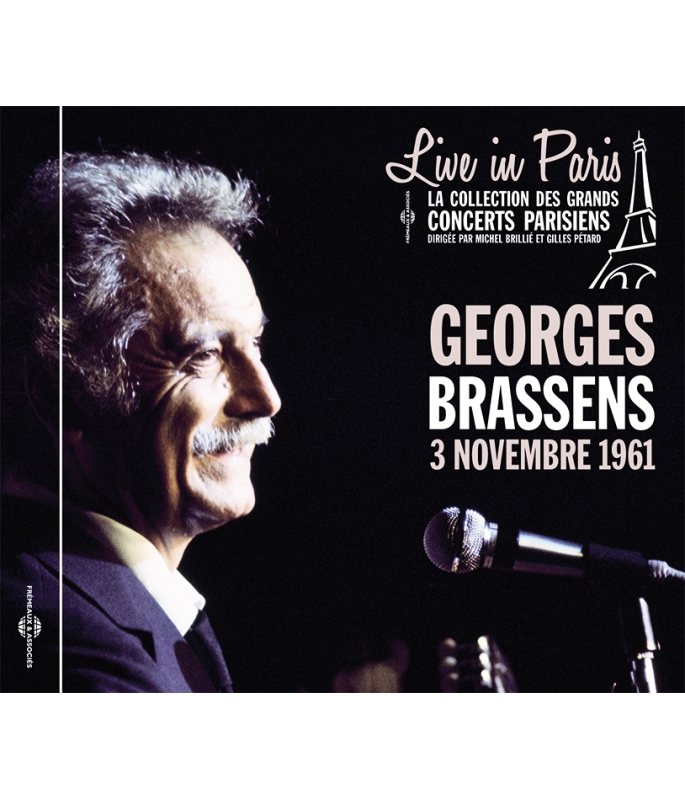
LIVE IN PARIS (3 NOVEMBRE 1961)
LIVE IN PARIS (3 NOVEMBRE 1961)
Georges Brassens is an eternally debonair figure of French song; if he were a monument he would belong to the National Heritage. The work of this poet born in Sète is unique — Brassens had no equivalent — and it seems to cross time without the slightest erosion of his imprint. Discreet and conscientious, the onstage personality of Brassens, at first hearing, seems very close to Brassens on record… And yet, here and there, you can sense the tiny crack or hesitation, or the sudden burst of song, which are the prerogative of a “live” recording and which reveal the humanity of his character. This rare sound-archive features a concert and two broadcast-sessions which have never been available on disc before. Patrick FRÉMEAUX
The Live in Paris collection by Michel Brillié allows listeners to hear previously-unreleased recordings (made at concerts and private- or radio-sessions) by the great 20th stars in jazz, rock & roll and song. These “live” takes, and the artists’ rapport with their audiences, gives these performances an additional soul and sensibility in counterpoint to the rigorous demands of studio recordings. Particular care was taken when restoring the sound of these tapes in order to meet CD standards while preserving the original colours of the period. Patrick FRÉMEAUX & Gilles PÉTARD
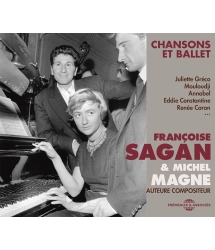
CHANSONS ET BALLET
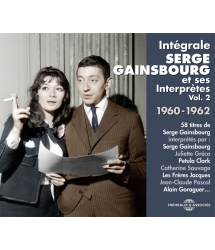
SERGE GAINSBOURG, JULIETTE GRÉCO, PETULA CLARK,...
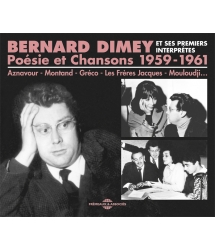
POÉSIE ET CHANSONS 1959-1961

LIVE IN PARIS - 21 MARS / 11 OCTOBRE 1960




-
PisteTitleMain artistAutorDurationRegistered in
-
1Le temps passeGeorges Brassens/Pierre NicolasGeorges Brassens00:03:151961
-
2La fille à cent sousGeorges Brassens/Pierre NicolasGeorges Brassens00:02:301961
-
3L'orageGeorges Brassens/Pierre NicolasGeorges Brassens00:03:311961
-
4La traîtresseGeorges Brassens/Pierre NicolasGeorges Brassens00:03:021961
-
5Le mécréantGeorges Brassens/Pierre NicolasGeorges Brassens00:03:341961
-
6La complainte des filles de joieGeorges Brassens/Pierre NicolasGeorges Brassens00:03:081961
-
7La marche nuptialeGeorges Brassens/Pierre NicolasGeorges Brassens00:03:261961
-
8Le vieux LéonGeorges Brassens/Pierre NicolasGeorges Brassens00:03:481961
-
9Tonton NestorGeorges Brassens/Pierre NicolasGeorges Brassens00:02:181961
-
10Celui qui a mal tournéGeorges Brassens/Pierre NicolasGeorges Brassens00:02:461961
-
11Dans l'eau de la claire fontaineGeorges Brassens/Pierre NicolasGeorges Brassens00:02:091961
-
12Le mauvais sujet repentiGeorges Brassens/Pierre NicolasGeorges Brassens00:02:491961
-
13La ballade des cimetièresGeorges Brassens/Pierre NicolasGeorges Brassens00:03:291961
-
14Le temps ne fait rien à l'affaireGeorges Brassens/Pierre NicolasGeorges Brassens00:02:501961
-
15Chanson pour l'AuvergnatGeorges Brassens/Pierre NicolasGeorges Brassens00:03:221961
-
16Les funérailles d'antanGeorges Brassens/Pierre NicolasGeorges Brassens00:04:401961
-
17La cane de JeanneGeorges Brassens/Pierre NicolasGeorges Brassens00:01:231961
-
18Les croquantsGeorges Brassens/Pierre NicolasGeorges Brassens00:02:191961
-
19La chasse aux papillonsGeorges Brassens/Pierre NicolasGeorges Brassens00:01:581961
-
20Le petit chevalGeorges Brassens/Pierre NicolasPaul Fort00:02:111961
-
21Brave MargotGeorges Brassens/Pierre NicolasGeorges Brassens00:03:151961
-
22Je me suis fait tout petitGeorges Brassens/Pierre NicolasGeorges Brassens00:02:591961
-
23Une jolie fleurGeorges Brassens/Pierre NicolasGeorges Brassens00:02:291961
-
24La marineGeorges Brassens/Pierre NicolasPaul Fort00:03:021961
-
25La légende de la nonneGeorges Brassens/Pierre NicolasVictor Hugo00:03:021961
Georges Brassens Live in paris FA5455
Live in ParisGeorges Brassens
3 novembre 1961
La collection des grands concerts parisiens
Dirigée par Michel Brillié et Gilles Pétard
Georges Brassens
LIVE IN PARIS
1961. Le monde tourne comme il peut. Au printemps, le cosmonaute soviétique Youri Gagarine a fait son petit tour dans l’espace. Le président John Kennedy a essuyé le fiasco de la Baie des Cochons, une tentative totalement ratée d’invasion de Cuba pour renverser Fidel Castro. En France, l’autodétermination du statut de l’Algérie a été adoptée par référendum. Les pourparlers de paix entre français et algériens ont débuté à Evian. Pourtant, à Paris, le 17 octobre, une manifestation d’immigrés algériens contre le couvre-feu se termine en tragédie. La police française réprime brutalement la marche pacifique, faisant de nombreuses victimes.
Le même automne 1961, Brassens, lui, tourne bien, et beaucoup. Fin Septembre 61, il est au Québec, accompagné de l’incontournable Pierre Nicolas à la contrebasse, pour donner une série de concerts à la Comédie Canadienne de Montréal. Du 23 au 28 Octobre, il enregistre les 8 nouveaux titres de son album « Numéro 8 », parmi lesquels « Dans l’eau de la claire fontaine » et l’éternel « Le temps ne fait rien à l’affaire ». Et puis, le 3 novembre, le jour même où est annoncée la nomination de « Monsieur U », le birman U Thant, au poste de secrétaire général des Nations Unies, Brassens va entamer un mois de récitals à l’Olympia, toujours flanqué de Nicolas. Pour ce marathon, il sera précédé en première partie de l’innovant groupe de jazz « Les Double Six », et d’attractions de music hall plus classiques, telles « The Fabulous Rutas Girls ». Pendant tout le mois de Novembre, Georges Brassens fait donc entendre au public parisien la totalité de ses huit nouvelles chansons.
Entendre, mais pas découvrir. Le Sétois a pour habitude de tester ses nouvelles œuvres dans les studios d’Europe N° 1, la nouvelle radio périphérique, voire « pirate » qui a diffusé dès sa création les chansons du poète, y compris celles interdites sur les ondes nationales. Une amitié indéfectible a vu ainsi le jour, amitié qui va perdurer jusqu’à la mort de Brassens. Avec Pierre Nicolas, Brassens se rend donc régulièrement à Europe N°1 pour « maquetter » ses futurs enregistrements, afin de juger de l’équilibre général, musique, paroles et son, et d’y apporter ses modifications avant fixation définitive de l’œuvre. Les auditeurs de la radio périphérique sont donc parfois gratifiés d’une avant-avant- première de certains titres, ou encore d’interprétations plus personnelles de chansons déjà gravées. C’est ainsi que, fin 1955-début 1956, à l’occasion d’une série d’émissions avec l’écrivain René Fallet, Georges Brassens réenregistre à Europe 1 une bonne vingtaine de chansons. L’ambiance y est chaleureuse, les amis sont présents, ce qui amène le chanteur à donner des versions plus intimes de ses classiques. Sa voix est plus proche, plus fragile : il y a une sorte de fêlure dans ces variantes. Plus de swing, parfois plus près du blues que de la rive gauche…
Pour en revenir à la scène, le compte rendu d’une prestation de Brassens représente le cauchemar ultime d’un rédacteur. Il n’y a pas grand-chose à raconter. Sobre, pudique, voire timide, le chanteur enchaîne les chansons sans ajouter aucun commentaire. Entre chacune, il plaque quelques accords pour vérifier la justesse de sa guitare, parfois se tournant vers Pierre Nicolas. Le contrebassiste en effet est le compagnon de scène efficace et discret du chanteur : il soutient et encourage Brassens pendant le spectacle, il rit de ses bons mots ou commentaires en aparté. Et surtout, Brassens ayant du mal à mémoriser l’ordre de ses chansons, il le renseigne pendant les pauses sur la suite du tour de chant. De temps à autre Pierre Nicolas fait une réflexion à mi-voix sur la qualité du public du soir. Si Brassens en sourit, ça ne se voit guère…
Le public de Brassens est à l’instar du chanteur. Il écoute avec respect, et attention chaque mot du poète, chaque vers, chaque strophe. Il ponctue chaque interprétation d’applaudissements chaleureux mais néanmoins contenus. Tout comme Brassens, son public est pudique. A peine s’il laisse percer son enthousiasme à la dernière chanson…
Reste le sentiment d’un spectacle bien huilé, où l’exigence de perfection de Brassens transparaît à tout moment. Pas de débordement, pas d’improvisation – pas ou peu de dialogue avec le public. Une sorte de cours magistral de poésie, et de musique, donné par l’artiste qui symbolise pour toujours la chanson française.
Dédié à Claude Boquet, Bill Dubois, Jean Claude, Philippe Moch et toute la bande.
Michel BRILLIÉ
© FRÉMEAUX & ASSOCIÉS 2014
Georges Brassens
LIVE IN PARIS
1961. The world turns as best it can. In the spring of 61, Soviet cosmonaut Yuri Gagarin has taken his little trip in space. President Kennedy has endured the total failure of the Bay of Pigs Operation, an aborted attempt to overthrow Fidel Castro in Cuba. In France, the country has approved by referendum the principle of “Autodétermination”, the ability of the Algerian people to decide of its status of independence from colonial France. The Peace Talks between the 2 countries have begun in the city of Evian. Still, on October 17, in Paris, a peaceful demonstration of Algerian workers turns to tragedy. The French police brutally represses the marchers, leaving numerous victims on the Parisian cobblestones, and even in the Seine river.
At the same time, in the fall of 1961, Georges Brassens is at his peak of popularity. At the end of the month of September, he travels to Quebec for a series of concerts at the Comédie Canadienne in Montréal. Later, still backed by his faithful friend Pierre Nicolas on bass, he records from October 23 to 28 the 8 new songs that are included in his forthcoming LP, “Brassens N°8”. Then, on November 3, 1961, the same day Burmese U Thant is named as Secretary General to the United Nations, Brassens begins a month-long stay at the famed Olympia Theater in Paris, with, as usual, Pierre Nicolas at his side. For this marathon-like venue, the opening act is a new and innovative jazz sextet, “Les Double-Six”, along with music-hall traditional numbers such as “The Fabulous Rutas Girls”. Throughout November, Georges Brassens will have the French audience listen to the entirety of his new songs.
However, some of the attending public is already familiar with those songs: the man from Sète has made it a recurring habit to try his newest works in the recording studios of Europe N°1 Radio. Since its creation, the station has supported Brassens’s controversial works, and thus a solid friendship has developed between the singer and the radio staff. Brassens frequently books one of Europe n°1’s studios to test the overall balance of his songs, words, music and sound, and then listen to these demos for alterations. This way the core listeners of this radio are lucky enough to be treated to “sneak previews” of unreleased works. Georges Brassens also re-records some of his classic songs at Europe N°1, to give them a more personal, intimist feeling. In the few songs selected here, his voice has a kind of fragility that is not found in the official recordings. A bit more swing too, with a definite touch of blues .
To get back to Brassens’ live appearances, reviewing his stage act is every writer’s ultimate nightmare. There isn’t much to tell. The man is sober, restrained, and shy; he segues songs without any introduction or commentary. Between each of them, he strums his guitar to check tuning, and sometimes turns sideways to Pierre Nicolas. The bass player is in fact a discreet and efficient stage companion. He supports and encourages Brassens during the show, laughs at his side jokes and commentaries. Mostly, Nicolas cues Brassens for the order of songs to be performed, that the chanteur sometimes forgets. On occasions, Pierre Nicolas will issue mezzo voce an appraisal of the audience of the day. If Brassens is amused by it, it doesn’t show very much…
Brassens’s audience is typically like its master. They listen with respect and attention to each word, each verse of each song. They applaud warmly but with reserve at the end. Just like the man, it is a modest crowd, that may show its appreciation only after the final song.
One has the overall feeling of a well oiled performance, during which Brassens’s need of perfection is constant. No overflow, no improvisation, little or no dialogue with the audience. A kind of master class of poetry and music, given by the artist that is the symbol of French chanson today and forever.
Michel BRILLIÉ
Dedicated to Claude Boquet, Bill Dubois, Jean Claude, Philippe Moch and the gang
© FRÉMEAUX & ASSOCIÉS 2014
1. Le temps passsé (Georges Brassens) 3’15
2. La fille à cent sous (Georges Brassens) 2’30
3. L’orage (Georges Brassens) 3’31
4. La traîtresse (Georges Brassens) 3’02
5. Le mécréant (Georges Brassens) 3’34
6. La complainte des filles de joie (Georges Brassens) 3’08
7. La marche nuptiale (Georges Brassens) 3’26
8. Le vieux Léon (Georges Brassens) 3’48
9. Tonton Nestor (Georges Brassens) 2’18
10. Celui qui a mal tourné (Georges Brassens) 2’46
11. Dans l’eau de la claire fontaine (Georges Brassens) 2’09
12. Le mauvais sujet repenti (Georges Brassens) 2’49
13. La ballade des cimetières (Georges Brassens) 3’29
14. Le temps ne fait rien à l’affaire (Georges Brassens) 2’50
15. Chanson pour l’Auvergnat (Georges Brassens) 3’22
16. Les funérailles d’antan (Georges Brassens) 4’40
17. La cane de Jeanne (Georges Brassens) 1’23
18. Les croquants (Georges Brassens) 2’19
19. La chasse aux papillons (Georges Brassens) 1’58
20. Le petit cheval (Paul Fort/Georges Brassens) 2’11
21. Brave Margot (Georges Brassens) 3’15
22. Je me suis fait tout petit (Georges Brassens) 2’59
23. Une jolie fleur (Dans une peau de vache) (Georges Brassens) 2’29
24. La marine (Paul Fort/Georges Brassens) 2’20
25. La légende de la nonne (Victor Hugo/Georges Brassens) 3’02
Total time 1h12’33
Recorded by: Europe N°1 Technical Staff
Recording dates
Tracks 1 to 16: November 4,1961
Tracks 17 to 19: November 28 ,1955
Tracks 20 & 21: December 5 ,1955
Tracks 22 & 23: December 12 ,1955
Tracks 24 & 25: December 26 ,1955
Recording places
Tracks 1 to 16: Olympia Theater, Paris, France
Tracks 17 to 25: Europe N°1 Radiostation Studios
Personnel
Georges Brassens : Vocal, guitar
Pierre Nicolas : Bass
Figure éternelle et débonnaire de la Chanson française, Georges Brassens fait partie du patrimoine immatériel. L’œuvre du poète sétois, unique et sans équivalence, traverse le temps sans que son empreinte ne s’érode. Discret, consciencieux, le personnage de Brassens sur scène semble, lors de la première écoute, très proche du Brassens sur disque… Toutefois l’on y découvre pourtant quelques fêlures, ou bris de voix, ou envolées qui sont l’apanage du direct et révèlent l’humanité du personnage. Un document rare rassemblant un concert et deux sessions radiophoniques inédits sur disque.
Patrick FRÉMEAUX
Georges Brassens is an eternally debonair figure of French song; if he were a monument he would belong to the National Heritage. The work of this poet born in Sète is unique — Brassens had no equivalent — and it seems to cross time without the slightest erosion of his imprint. Discreet and conscientious, the onstage personality of Brassens, at first hearing, seems very close to Brassens on record… And yet, here and there, you can sense the tiny crack or hesitation, or the sudden burst of song, which are the prerogative of a “live” recording and which reveal the humanity of his character. This rare sound-archive features a concert and two broadcast-sessions which have never been available on disc before.
Patrick FRÉMEAUX
La collection Live in Paris, dirigée par Michel Brillié, permet de retrouver des enregistrements inédits (concerts, sessions privées ou radiophoniques), des grandes vedettes du jazz, du rock & roll et de la chanson du XXe siècle. Ces prises de son live, et la relation avec le public, apportent un supplément d’âme et une sensibilité en contrepoint de la rigueur appliquée lors des enregistrements studios. Une importance singulière a été apportée à la restauration sonore des bandes, pour convenir aux standards CD tout en conservant la couleur d’époque.
Patrick FRÉMEAUX & Gilles PÉTARD
The Live in Paris collection by Michel Brillié allows listeners to hear previously-unreleased recordings (made at concerts and private- or radio-sessions) by the great 20th stars in jazz, rock & roll and song. These “live” takes, and the artists’ rapport with their audiences, gives these performances an additional soul and sensibility in counterpoint to the rigorous demands of studio recordings. Particular care was taken when restoring the sound of these tapes in order to meet CD standards while preserving the original colours of the period.
Patrick FRÉMEAUX & Gilles PÉTARD
CD Georges Brassens Live in Paris 3 novembre 1961, Georges Brassens © Frémeaux & Associés 2014.
